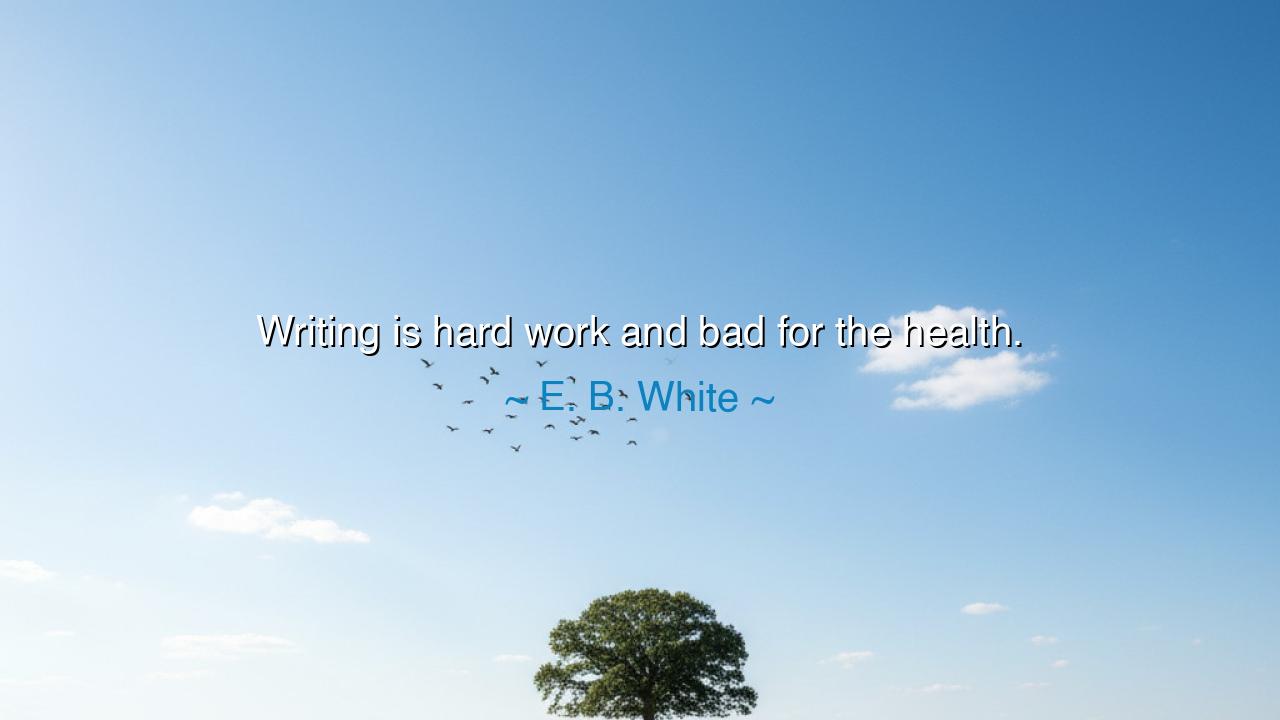
Writing is hard work and bad for the health.






“Writing is hard work and bad for the health.” — thus spoke E. B. White, the quiet craftsman of words, whose prose carried both the tenderness of simplicity and the weight of eternal truth. At first, his declaration may sound like jest — a weary sigh from a man long bound to his desk. Yet within these few words lies the deep and ancient pain of all who labor with thought and ink. For writing, though gentle in appearance, is one of the most demanding labors of the spirit. It calls upon the writer not merely to speak, but to bleed, to wrestle with silence and bring forth the living word. And in that struggle, as White reminds us, there is both creation and cost.
In the ancient days, before the pen or the printing press, the scribe was a sacred figure — one who turned the intangible into form. Yet even then, the task was one of endurance. The hand cramped, the eyes dimmed, and the mind carried the burden of shaping chaos into clarity. The hard work of writing is not measured in sweat or strength, but in the quiet battles fought within: the war against doubt, fatigue, and the endless imperfection of language. To write is to face oneself — to strip away falsehood and vanity until truth, raw and trembling, stands revealed. No wonder it wears upon the body. No wonder it weighs upon the heart.
Consider the life of Franz Kafka, who by day worked in a dreary office, and by night poured his soul into pages that few would read before his death. His health was frail, his lungs consumed by illness, yet he could not cease the act of creation. Writing for him was both torment and necessity — the only means of making sense of the world’s darkness. He once confessed that a non-writing day made him sick in spirit. In this, we see what E. B. White meant: that writing drains the life-force, even as it gives meaning to life itself. It is a paradox — a sacred suffering.
White himself knew this struggle intimately. Though he wrote of farms and spiders, of simple joys and quiet wisdom, his words were forged in long hours of reflection. Every sentence of Charlotte’s Web or The Elements of Style carries the mark of patience and precision, the toll of discipline and devotion. Writing is not the easy art of inspiration, but the slow, deliberate act of carving truth from chaos. To live as a writer is to live always in battle — between what one feels and what one can express. And in that battle, the mind grows weary even as the soul grows wise.
Yet let us not despair at this truth. For though writing is hard work and bad for the health, it is also the path by which humanity endures. The writer, through his suffering, gives voice to the voiceless, light to the lost, and meaning to the fleeting. The great authors of every age — from Homer to Toni Morrison — have known this burden. They have paid in sleepless nights and aching hearts so that others might dream and understand. Like the blacksmith at his forge, the writer strikes at the iron of language until it glows with beauty. The cost is real — but so too is the creation.
The lesson, then, is not to avoid hard work, but to embrace it as the crucible of meaning. Whatever your craft — whether writing, art, or labor of another kind — know that creation demands sacrifice. Do not flee from difficulty or fatigue; for in the ache of effort, your spirit is refined. Let the writer’s struggle be your mirror: if your work is hard, you are on the right path. If it costs you something, it is worth something.
So, children of thought and toil, remember this: writing may be bad for the body, but it strengthens the soul. The hand may tremble, the eyes may tire, but the heart grows vast in the act of creation. To write is to give of one’s life so that others may see more clearly. It is, as White knew, both burden and blessing — the beautiful curse of those who would make the invisible visible. And in the end, though the body may weary, the word — once born — lives forever.






AAdministratorAdministrator
Welcome, honored guests. Please leave a comment, we will respond soon